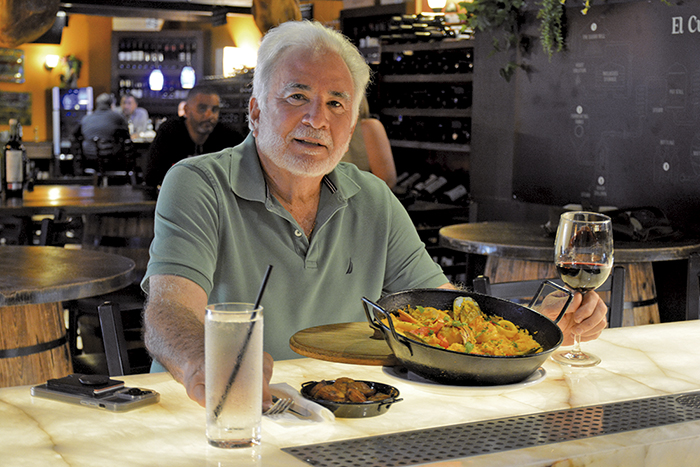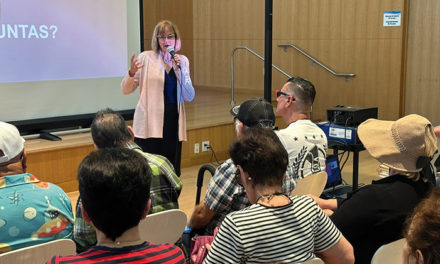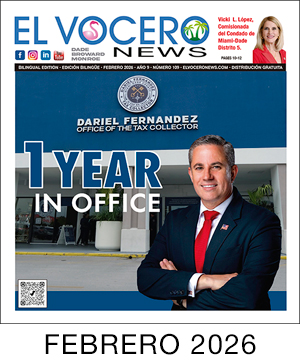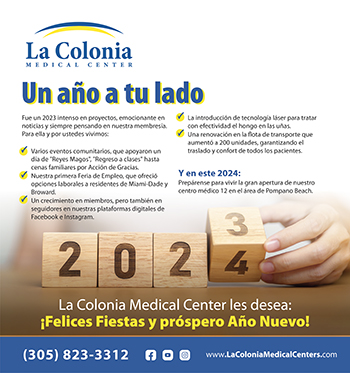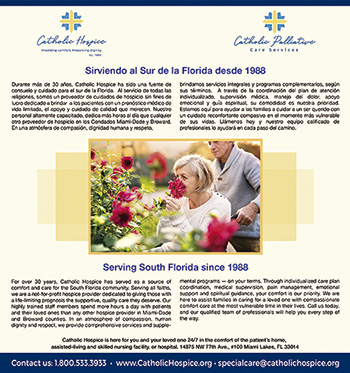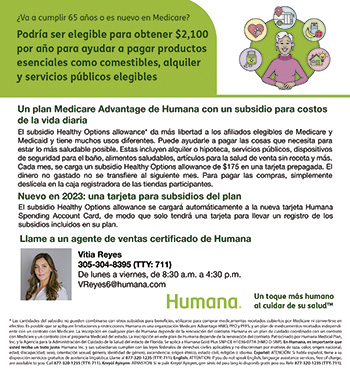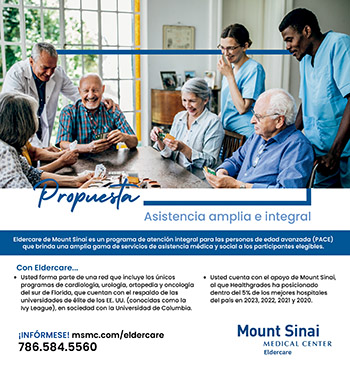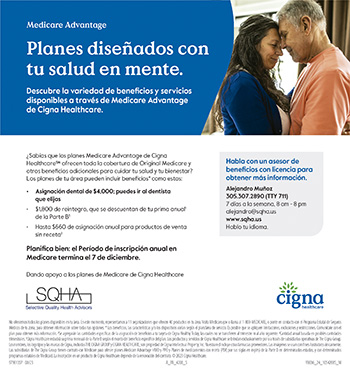Miguel Peña: “Living in a free country is the greatest thing you can have.”
Jesus Hernandez
Cubans remember the hard days of the Mariel boatlift, when many of them escaped the dictatorship in Cuba. Miguel Peña, now a successful man at the helm of La Bodeguita restaurant in Hialeah, is celebrating his arrival in the United States 45 years ago.
In fact, Miguel, who owns the restaurant, organized the celebration of the largest escape recorded in the history of the Western Hemisphere with a grand party at the Hialeah Park Casino.
“It was a very emotional reunion where people who had never met finally met, and others who hadn’t seen each other for a long time met again,” he exclaimed.
“We celebrate courage, memory, and freedom with music, dancing, food, drinks, an exhibition of photographs and videos from Mariel, and even a boat to remember what we lived 45 years ago,” he emphasized.
The idea was “to remember and celebrate having arrived in this country,” he remarked, “where we have been able to live in freedom and move forward.”
He also acknowledged, “We would like to thank those who made Mariel possible. Those who entered the Peruvian Embassy in Havana and made it possible for the crisis to lead to the exodus, and all those who sailed their boats to the island and risked their lives to bring us here.”
Mariel
Indeed, between April 15 and October 31, 1980, more than 125,000 human beings crossed the Straits of Florida en route to the United States through the port of Mariel, east of Havana. Many of those who arrived then are now prominent businesspeople, intellectuals, and influential personalities whom historians claim changed the social and cultural landscape of Greater Miami.
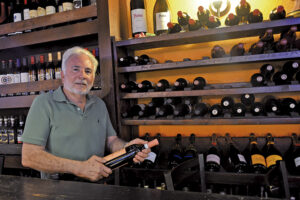 These were difficult days, filled with uncertainty and harrowing experiences, which led to life changes after escaping the dictatorship on the island.
These were difficult days, filled with uncertainty and harrowing experiences, which led to life changes after escaping the dictatorship on the island.
Peña recalls crossing the Straits of Florida at age 23 with his grandparents, father, and sister, after spending a week in a stadium and three days in a shelter near Mariel.
“It was sad to see how Cubans, under the government’s instructions, tried to humiliate us. They insulted us, called us horrible things for wanting to leave, but it was also comforting to see how we were welcomed in Key West. We were welcome with joy, with love, even though we were strangers to them,” he stated.
The boats, packed with people, literally crammed in many cases, also brought several unwanted individuals from prisons and psychiatric hospitals, whom the Cuban authorities quietly smuggled in.
“That did a lot of damage to the reputation of those of us who came through Mariel,” he recalled.
According to statistics given by US authorities, only 14% of the refugees were unwanted, but it was enough to create a stigma that took years to dispel.
However, the vast majority, 86%, were able to integrate into the American way of life and progress in multiple ways.
“Many arrived as children. They grew up, studied here, started their families, and forged their future,” he asserted.
“I made my life here. I had my children here, my grandchildren, and I want them to know where we came from, what we have experienced. I’ve shown them photos and videos of the sad things they did to us in Cuba so they can appreciate what they have here,” he emphasized.
“My father told me that the greatest wealth he provided me with was being able to live in a free country, and that’s what I’m providing my children, my grandchildren. That’s the greatest thing a human being can have,” he reassured.
La Bodeguita
Peña began working as a construction worker, demolishing buildings to make way for new constructions.
“We had trucks and heavy equipment, and I worked there for many years,” he said.
Later, after saving some money, he managed to open a liquor and wine store, where he specialized in wines.
“I had three liquor stores. I was almost retired, but I had the opportunity to buy a Spanish restaurant and the shopping center where it’s located,” he summarized.
Along with his son, Michael, Peña chose to preserve much of the restaurant’s decor, with that captivating look that varnished wood have in taverns.
“Michael convinced me to buy the place; he studied cooking, and here he is. He’s dedicated himself to creating new things,” he commented.
And together they decided on a unique menu that combines Spanish, Cuban, and international dishes.
In this manner, everyone is pleased when they sit down at the table at La Bodeguita, at 2005 W 4th Ave, Hialeah. One person orders paella or lamb chops, another one orders vaca frita or fried pork loin and rice, even spaghetti, chicken or beef Milanese, or mahi-mahi with béchamel sauce.
“We have paella. We have farmer style rice. We have pork loin. We have meat. We have fish. We have a menu with many choices,” he emphasized.
In other words, you can order paella and tostones together.
But the croquettes, whether they are made of Serrano ham and Manchego cheese, chorizo, or paella, make one of the top favorite dishes.
“We have a lot of wine. A wide variety of wines, red and white, as well as beers, and cocktails,” he added.
In fact, Spanish Ribera del Duero and Rioja wines are the most popular, followed by those from California.
“But we also have wines from Argentina, France, Italy, from all the major producers,” he stated.
“It’s a blend of cultures, and flavors,” he added.
Peña admits he doesn’t know how to cook. “I only know how to roast suckling pig, but I had very good advisors, cooks, people who know how to cook very well, and I sought out the best, and we still have the two cooks who opened the restaurant with us more than 10 years ago here,” he added.
He doesn’t know how to cook, but he knows how to manage a business. «I know what’s good and what’s not. What works. I like things to run as smoothly as possible, and I try to provide the restaurant with the best products, the best waiters, the best service, and music to make people feel good. That’s the important thing,» he concluded.
There’s music, from saxophone, violin, and guitar to flamenco rumba from Tuesday to Friday and flamenco dancers on Saturday.
And on Sundays too: saxophone, guitar, and other musical instruments.
When asked, «What’s easier to manage, the liquor store or the restaurant?» he replied: «Both businesses are good and difficult. All businesses require sacrifice. All businesses require attention. But when you have good employees, it becomes easier to manage.»
Miguel Peña, un hombre de éxito al frente del restaurante La Bodeguita en Hialeah
Miguel Peña: “Vivir en un país libre es lo más grande que un ser humano puede tener”
Jesús Hernández
Miles de cubanos guardan en la memoria los turbulentos días del éxodo de Mariel que permitió a muchos escapar de la dictadura en Cuba, y Miguel Peña, que hoy es un hombre de éxito al frente del restaurante La Bodeguita en Hialeah, celebra haber llegado a Estados Unidos hace 45 años.
De hecho, Miguel, que es propietario del restorán, organizó la celebración de la mayor escapada que registra la historia en el hemisferio occidental con una gran fiesta en el Hialeah Park Casino.
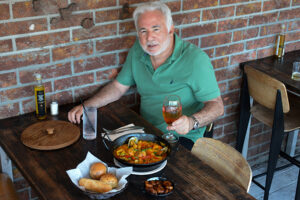 “Fue un encuentro muy emotivo donde personas que no se conocían se conocieron y otras que no se veían hace mucho tiempo se volvieron a ver”, resumió.
“Fue un encuentro muy emotivo donde personas que no se conocían se conocieron y otras que no se veían hace mucho tiempo se volvieron a ver”, resumió.
“Celebramos el coraje, la memoria y la libertad con música, baile, comida, bebidas, exposición de fotografías y vídeos de Mariel y hasta una embarcación para recordar lo que vivimos hace 45 años”, destacó.
La idea era “recordar y celebrar haber llegado a este país”, subrayó, “donde hemos podido vivir en libertad y salir adelante”.
También “dar las gracias a quienes hicieron posible Mariel. Quienes entraron a la Embajada del Perú en La Habana y propiciaron que la crisis conllevara al éxodo, y todos los que llevaron barcos y arriesgaron sus vidas para traernos”, reconoció.
Mariel
En efecto, entre el 15 de abril y el 31 de octubre de 1980 más de 125.000 seres humanos atravesaron el Estrecho de Florida rumbo a EEUU por el puerto de Mariel, al este de La Habana. Muchos de quienes llegaron entonces hoy son grandes empresarios, intelectuales, personalidades influyentes que historiadores afirman cambiaron el panorama social y cultural del Gran Miami.
Fueron días duros, de incertidumbre y experiencias estremecedoras, que condujeron a cambios de vida después de escapar de la dictadura en la isla.
Peña recuerda que cruzó el Estrecho de Florida a los 23 años con sus abuelos, padre y hermana, tras pernoctar una semana en un estadio y tres días en un albergue cerca de Mariel.
“Fue triste ver cómo cubanos dirigidos por el gobierno trataban de humillarnos. Nos ofendían, nos decían horrores por querer irnos, pero también fue reconfortante ver cómo nos recibieron en Cayo Hueso. Nos recibieron con alegría, con cariño, a pesar de que éramos extraños para ellos”, contrapuso.
Las embarcaciones, repletas de personas, literalmente amontonadas en muchos casos, también trajeron un número de indeseados, procedentes de cárceles y siquiátrico, que las autoridades cubanas introdujeron en silencio.
“Eso hizo mucho daño a la reputación de quienes vinimos por Mariel”, rememoró.
Según cifras estimadas por autoridades estadounidenses, solo el 14% de los refugiados serían indeseados, pero suficiente para crear un estigma que demoró años aplacar.
No obstante, la inmensa mayoría, el 86%, fue capaz de incorporarse al sistema de vida estadounidense y progresar de múltiples maneras.
“Muchos llegaron siendo niños. Crecieron, estudiaron aquí, hicieron sus familias y forjaron su futuro”, recalcó.
“Aquí he hecho mi vida. Tuve a mis hijos aquí, mis nietos, y quiero que conozcan de dónde venimos, lo que vivimos. Les he mostrado fotos, vídeos de las cosas que nos hicieron en Cuba para que sepan apreciar lo que tienen aquí”, enfatizó.
“Mi padre me dijo que la mejor riqueza que me dejaba era poder vivir en un país libre, y eso es lo que dejo a mis hijos, mis nietos. Eso es lo más grande que un ser humano puede tener”, aseveró.
La Bodeguita
Peña comenzó a trabajar como obrero de la construcción, específicamente la demolición de inmuebles para dar paso a nuevas construcciones.
“Teníamos camiones y equipos pesados y trabajé ahí por muchos años”, señaló.
Más tarde, tras tener unos ahorros, logró establecer una tienda de licores y vinos, donde precisamente se especializó en vinos.
“Llegué a tener tres licorerías. Ya estaba medio jubilado y surgió la oportunidad de comprar un restaurante español y el shopping center donde está”, sintetizó.
Junto a su hijo Michael, Peña optó por preservar buena parte de la decoración del restaurante, con ese cautivador aspecto que ofrece la madera barnizada en una taberna.
“Michael me convenció para comprar el local, estudió cocina y ahí está. Se ha dedicado a hacer cosas nuevas”, comentó.
Y juntos apostaron por un peculiar menú donde conviven platos españoles, cubanos e internacionales.
De esta manera, todos son complacidos al sentarse a la mesa en La Bodeguita, en 2005 W 4th Ave, Hialeah. Uno pide paella o chuletillas de cordero, otro vaca frita o masitas de puerco fritas y arroz congrí, incluso espaguetis, milanesa de pollo o res o mahi mahi con salsa bechamel.
“Tenemos paella. Tenemos arroz campesino. Tenemos masas de puerco. Tenemos carne. Tenemos pescado. Tenemos un menú muy variado”, remarcó.
O sea, que se puede pedir una paella con tostones.
Pero las croquetas, sean de jamón serrano y queso manchego, chorizo o paella complacen el paladar de todos.
“Tenemos mucho vino. Una gran variedad de vinos, tinto y blanco, además de cervezas, bebidas y cócteles”, complementó.
De hecho, los vinos Ribera del Duero y Rioja son los más populares, seguidos por los de California.
“Pero también tenemos vinos de Argentina, Francia, Italia, de todos los productores importantes”, afirmó.
“Es una mezcla de culturas, de gustos y paladares”, destacó.
Peña reconoce que no sabe cocinar. “Solo sé asar lechón, pero tuve muy buenos asesores, cocineros, gente que sabe cocinar muy bien, y busqué los mejores, y aún tenemos aquí los dos cocineros que abrieron el restaurante con nosotros hace más de 10 años”, resaltó.
No sabe cocinar, pero sabe administrar. “Conozco lo que es bueno o no. Lo que funciona. Me gusta que las cosas salgan lo mejor posible y trato de ponerle al negocio los mejores productos, los mejores camareros, la mejor atención y música para que la gente se sienta bien. Eso es lo principal”, acentuó.
Dijo música y música hay, desde saxofón, violín y guitarra hasta rumba flamenca de martes a viernes y bailaoras de flamenco el sábado.
Y el domingo también: saxofón, guitarra y otros instrumentos.
A la pregunta, ¿Qué es más fácil administrar, la licorería o el restaurante? respondió: “Los dos negocios son buenos y son difíciles.
Todos los negocios llevan sacrificio. Todos los negocios hay que atenderlos. Pero cuando tienes buenos empleados se te hace más fácil”.

